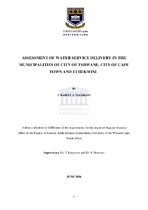Assessment of water service delivery in the municipalities of City of Tshwane, City of Cape Town and Ethekwini
Abstract
Access to water and water scarcity are the most critical impediments to sustainable development in municipal water provision. Good water and sanitation services are essential for health, economic development, and environmental protection. Recognizing the importance of access to a safe and adequate water supply, has become the core business of many cities. Among the major challenges facing local government regarding basic service provision in South Africa are acute problems of institutional capacity, maintenance of existing infrastructure, mismanagement of funds, high levels of corruption and a lack of public anticipation. There has been public outcry in South Africa about poor performance of municipalities in service delivery. Moreover, a good proportion of service delivery protests relate to municipalities‟ failure to carry out basic maintenance of existing infrastructure. The aim of this study was to assess water service delivery performance in the Municipalities of the City of Tshwane (CoT), City of Cape Town (CoCT) and EThekwini Metropolitan by comparing water service delivery for the three Water Service Authorities (WSAs). In this study the performance of Water Service Authorities is measured using the Regulatory Performance Measurement System (RPMS) using 11 regulatory Key Performance Indicators (KPIs). To find answers to research questions and objectives, the research was conducted through desktop research incorporating both quantitative and qualitative dimensions. Exploring the datasets and frequency tabulations were employed. For the analysis of the relative performance levels toward gaining access to water and sanitation services, the RPMS tool was used. The particular indicators of interest were the changes in performance levels in the provision of basic services for different segments based on RPMS. In line with our findings for Financial Performance Indicator (KPI 9) water supply in the WSAs is undertaken by local government that have the dual objectives of providing a social service while generating revenue to offset cost. Ironically, most of these WSAs do not recover their operating expenses from their own revenues, and remain dependent on state government for subsidies. The study concludes that the CoT is the best performer on the Financial Performance (KPI 9).The KPI requiring attention is Financial Performance (KPI 9) for the CoCT and EThekwini WSAs with indicators showing need for improvement. Compliance is encouraged for all WSAs on the Financial Performance Indicator (KPI 9) to ensure that their water business is sustainable. The study recommends that the relevant stakeholders and project proponents consider financial viability (sustainability) through the increase in value for money expenditure to grow and diversify revenue.

